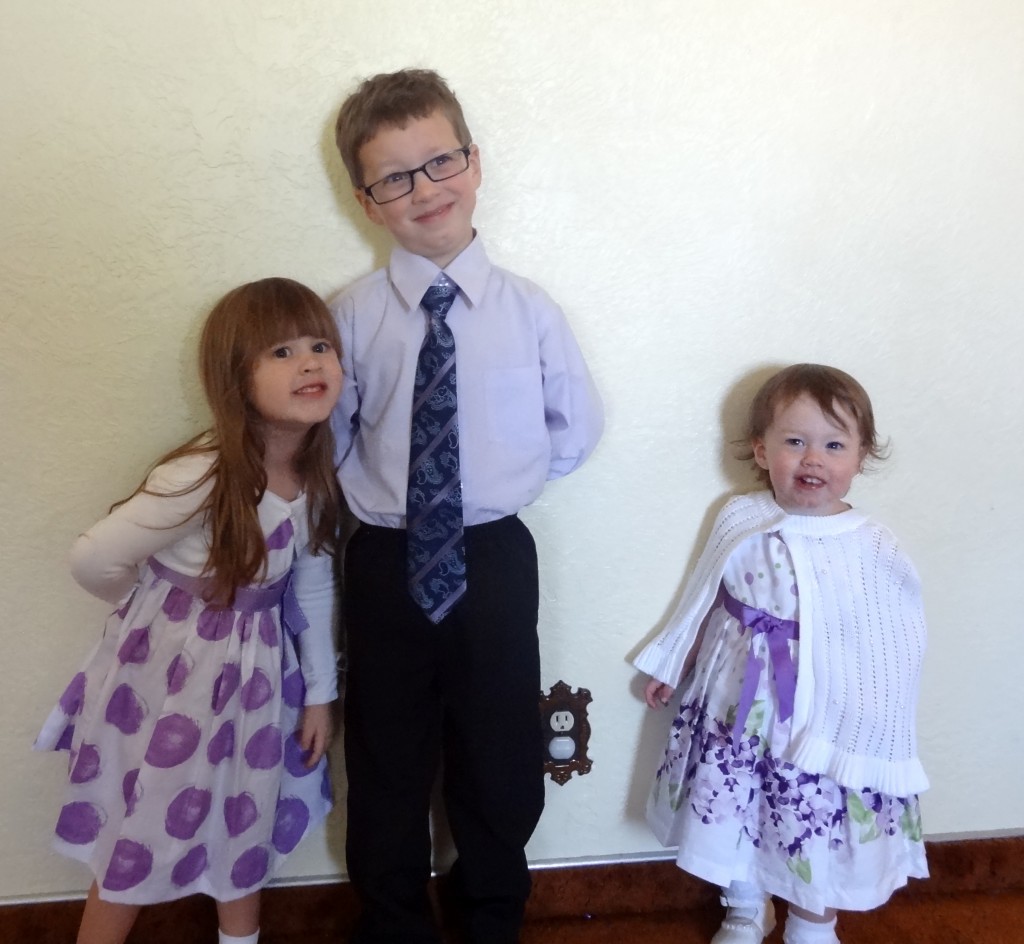Real Simple magazine recently reported that as of 2010, mothers (working and SAHMs) spend an average of fourteen hours a week on childcare—up from ten hours a week in 1965.
To which I say, um, what?
I realize I might be in the most time-intensive phase of parenting right now, where I still have young children at home, but I spend nearly fourteen hours a day with my children. And even if I my children were older and I were working, I would still have at least four hours a day in their presence on weekdays, and at least that on weekends.
I’m guessing (slash hoping) “child care” here means more than just “spending time with your child,” since I also have a hard time imagining mothers in 1965 shunting their children off for all but 85 minutes a day. I’m not “caring” for my children every single second of the day, but I’m still mothering them, whether the TV is on, whether they’re playing in the backyard, whether I’m on the computer—I’m on the clock, doling out food and punishments and advice. (So how is that not child care?)
But according to the Real Simple article, even two hours a day of caring for your own children is too much:
One study suggested that children who are the center of their parents’ universes may grow up to become more neurotic adolescents. The Free Range Kids movement, started by author Lenore Skenazy, has gained traction by advocating for unstructured and less-supervised play. Elisabeth Badinter, author of The Conflict, suggests that motherhood need not be a full-time profession. “Some parents believe that a good mother puts her child’s needs before everything else—and that’s not healthy,” says Badinter. Nor does it make us the best role models. After all, if our ultimate goal is to have our kids find personal fulfillment, perhaps we should lead by example: By putting ourselves at the top of our own to-do lists.
Wait, seriously? Somehow we’re saying that spending more than an hour and a half a day caring for your child is not only making them the center of your universe and putting yourself last, but also creating neuroses and makes us bad role models?
I think we’re conflating several very different things: taking care of our children, spending time with them and not making ourselves a priority. A very young child will not be able to tell the difference, but I would hope that an adult could. The difference isn’t something you measure in minutes: it’s measured in a mother’s mindset.
 Yes, my children are my top priority and the biggest segment of my day right now. Honestly, whether you’re working or staying at home—heck, whether your children are infants or adults—if your child really needed you, would you say, “Oh, honey, I’m having my me time. I’ll help you with that impending peril/broken arm/unplanned pregnancy during your allotted two hours”? Is that really the way to be a good example of personal fulfillment?
Yes, my children are my top priority and the biggest segment of my day right now. Honestly, whether you’re working or staying at home—heck, whether your children are infants or adults—if your child really needed you, would you say, “Oh, honey, I’m having my me time. I’ll help you with that impending peril/broken arm/unplanned pregnancy during your allotted two hours”? Is that really the way to be a good example of personal fulfillment?
Yes, we want our children to find personal fulfillment, and (obviously, I hope) we all want to find that ourselves. HOWEVER, I personally feel that exemplifying personal nirvana isn’t the main goal of full-time parenting. I have taken charge of my children’s formative years because I want to teach them the most important things in life—how to treat other people, the way to find true happiness (hint: it’s not by focusing only on yourself!), and the things we believe that will take them there—and that’s important enough to me to be willing to put in the time necessary to accomplish it.
A mother finding fulfillment in motherhood—in life—can put herself neither first nor last. Her children’s needs will come before hers quite regularly because she recognizes the level of commitment motherhood warrants, but she’s not going to forgo all meals until her children are independent, successful and grown.
She does model someone who sets personal goals, always learning, and devotes personal time to her own sanity and development. But she manages to do that in a very careful balance, managing her priorities and most of all her children and their physical and emotional needs. And importantly (to me), she looks for that personal fulfillment in the time she spends with (and caring for) her children, too. It is never easy, but it is worth it.
What do you think? What’s the difference between spending time with your children and “child care”? Can you spend too much time with your children?
Photo credits: watching timer—me!; multitasking dad—Henrik Betnér

 We’re often told raising our children isn’t enough: we should be “productive.” We should have “real jobs.” Strangers ask us to
We’re often told raising our children isn’t enough: we should be “productive.” We should have “real jobs.” Strangers ask us to  Woman is generally shut up in a house with a human being at the time when he asks all the questions that there are, and some that there aren’t. It would be odd if she retained any of the narrowness of a specialist.
Woman is generally shut up in a house with a human being at the time when he asks all the questions that there are, and some that there aren’t. It would be odd if she retained any of the narrowness of a specialist.  How can it be a large career to tell other people’s children about the Rule of Three, and a small career to tell one’s own children about the Universe? How can it be broad to be the same thing to everyone, and narrow to be everything to someone? No; a woman’s function is laborious, because it is gigantic, not because it is minute.
How can it be a large career to tell other people’s children about the Rule of Three, and a small career to tell one’s own children about the Universe? How can it be broad to be the same thing to everyone, and narrow to be everything to someone? No; a woman’s function is laborious, because it is gigantic, not because it is minute.


